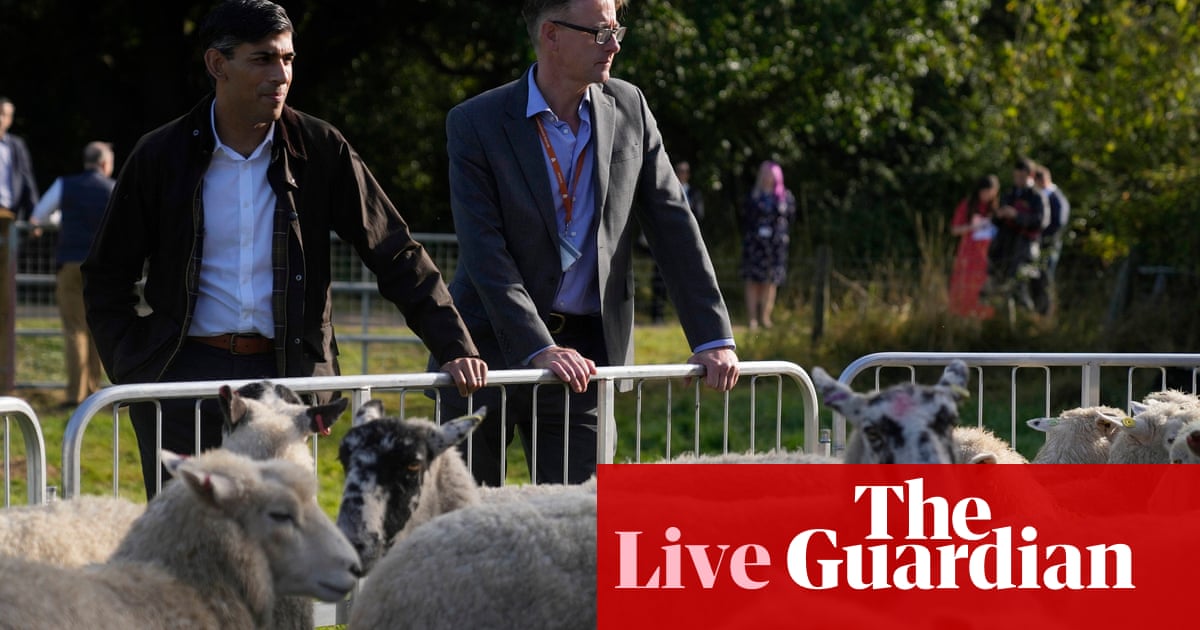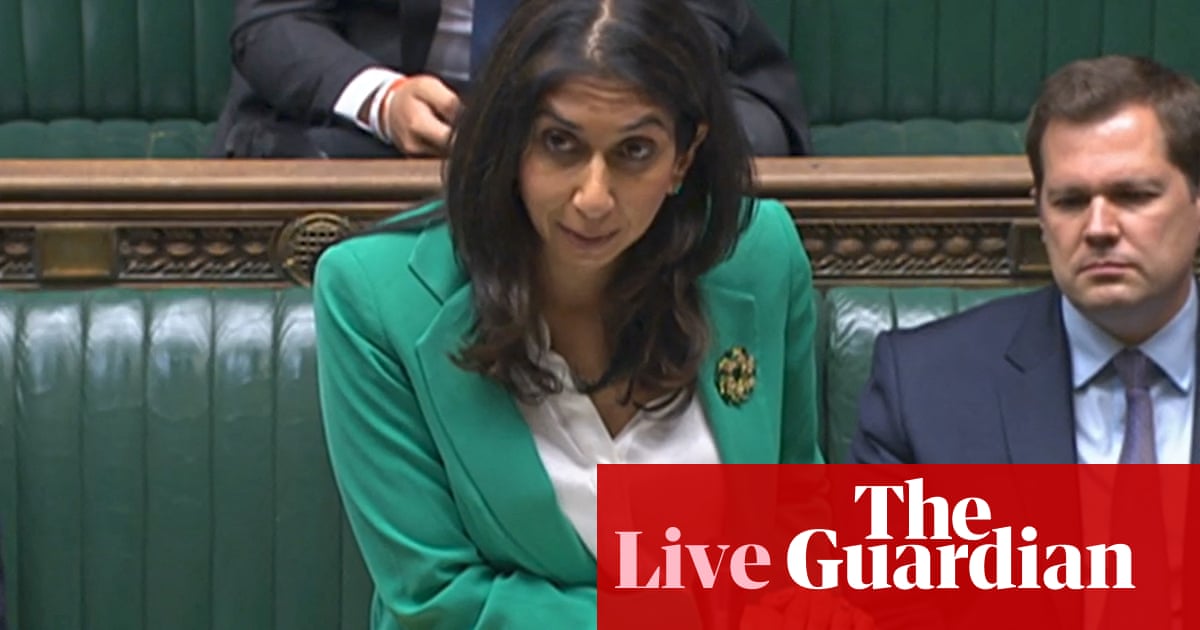
Two-thirds of people do not trust Tories on environment, poll finds
Two-thirds of people say they do not trust the Conservatives to make the right decisions on the environment, a poll had found.
The Ipsos poll was carried out between 20 and 21 September after the prime minister, Rishi Sunak, announced changes to his climate policies.
Those polled, however, were almost evenly split on whether they thought Sunak had made the right decision to make these changes, with 47% saying he had and 46% saying he hadn’t. Among 2019 Conservative voters, only 25% said Sunak had got it wrong.
It also found that 48% of those polled said they were now less confident the UK would meet its targets, including reaching net zero by 2050, while 13% said they were more confident.
End of day summary
Here’s a roundup of the key developments of the day:
The Tories have accused Keir Starmer of flip-flopping over the EU following claims Labour wants to effectively undo Brexit. Speaking on GB News on Friday morning, the environment minister, Mark Spencer, accused Labour of obsessing over Brexit and said Starmer seems to make policy up “on the hoof”.
Keir Starmer defended his approach to dealing with the European Union. Starmer told reporters in the City of London there was “no case for rejoining the EU, no case for the customs union or single market” and laws would be “made in this country for the public interest”.
The shadow chancellor, Rachel Reeves, dismissed claims Labour wanted to effectively undo Brexit. Reeves said what Labour want is “a better relationship with our nearest neighbours and trading partners”.
Two-thirds of people say they do not trust the Conservatives to make the right decisions on the environment, a poll had found. The Ipsos poll was carried out between 20 and 21 September after the prime minister, Rishi Sunak, announced changes to his climate policies.
Ministers would have to consult the official watchdog on major tax and spending changes under Labour plans that would prevent a repeat of Liz Truss’s ill-fated mini-budget, the shadow chancellor, Rachel Reeves, has said. The move would ensure the Office for Budget Responsibility (OBR) was not “gagged” by future prime ministers and chancellors trying to avoid an official financial forecast, she said.
The risks of a UK recession have risen as business activity is shrinking at the fastest pace since the financial crisis, when months hit by Covid-19 lockdowns are excluded, according to a closely-watched survey.
More than two-thirds of UK universities expected to take part in next week’s scheduled strikes called by the University and College Union (UCU) have now said they won’t take part. UCU announced that 89 out of the 140 potentially taking industrial action will not now do so, while 10 campus branches will strike for at least one day out of the five scheduled.
The chancellor, Kwasi Kwarteng’s speech at the Commons dispatch box on 23 September last year, and his refusal to publish the Office for Budget Responsibility’s autumn 2022 forecast on the state of the economy, led to a run on the pound, sharply higher borrowing costs and a crisis in the UK pensions industry.
A year on from Liz Truss and Kwarteng’s disastrous mini-budget, people from across the country shared with the Guardian how their lives and finances were affected by its chaotic aftermath.
Only four schools in Wales have been found to be constructed using Reinforced Autoclaved Aerated Concrete (Raac), which is thought to be dangerous if poorly maintained, according to a joint statement by Jeremy Miles, Wales’s minister for education, and Rebecca Evans, minister for finance and local government:
Last week, we confirmed updates had been received from all 22 local authorities at the end of the first stage of the education Raac identification process. To date, four schools have been identified with Raac – two in Anglesey, one in Conwy and one in Denbighshire.
Ysgol David Hughes, in Menai Bridge, reopened to all learners last Friday. Ysgol Uwchradd Caergybi is partially open to learners with face-to-face lessons for four school year groups. Structural engineers have been at Ysgol Maes Owen, in Kinmel Bay, this week to carry out a detailed inspection and assessment of the RAAC panels. Work has been carried out at Ysgol Trefnant, in Denbighshire, this week and the school will re-open on Monday.
We would like to place on record our thanks to school and local authority staff for all their hard work in recent weeks.
With four out of around 1,500 schools affected, Wales has a lower proportion affected than England, where 174 out of roughly 21,000 state schools have been identified so far.
Ed Davey is to pledge a £5bn-a-year guarantee of free care packages for all in England as the Liberal Democrats gather for their first in-person conference since 2019.
Desperate to translate recent byelection successes into a mass haul of parliamentary seats, the Lib Dem leader plans to use the event in Bournemouth, which starts on Saturday, to become the first of the major UK political parties to set out a suite of specific policy ideas.
With the election due next year, delegates will debate and vote on a 50-page “pre-manifesto” setting out a series of promises, some more general but others, like the care pledge, notably specific.
Speaking to the Guardian before the conference, which follows the cancellation of the 2020 and 2021 events due to Covid and last year’s because it clashed with Queen Elizabeth II’s funeral, Davey said a plan for care was all the more vital after Theresa May and Boris Johnson reneged on promises to reform the creaking sector.
The idea is to mimic the policy in Scotland, where what is known as personal care – the attentions of a carer, either at home or in a care setting – are free, which Davey said would allow many more people to return home quickly from hospital, freeing up beds.
While the upfront costs to roll this out in England would be about £5bn a year, Davey said the savings to the NHS would claw back at least £3bn of this.
SNP Europe spokesman Alyn Smith said his party was now “the only major party committed to rejoining the EU”.
He said:
With Starmer, Sunak and Davey – the three bungling Brexiteers of UK politics – all throwing in the towel and ruling out any return to Europe, it’s clear independence is Scotland’s only route back to EU prosperity and the only escape from the long-term damage of Brexit.
Ed Davey has insisted he is not interested in a pre-election pact with Labour to oust Rishi Sunak.
As the party’s activists gathered in Bournemouth for what could be the final Lib Dem autumn conference before a general election, the Liberal Democrat leader also stressed that the prospect of reversing Brexit - a policy which formed the centrepiece of the 2019 campaign - was off the table.
Davey said he was not having conversations with Keir Starmer, but he told 5 News:
I have to say I am sick and tired of the Tories.
Even in coalition with them I fought the Tories every single day.
But he said he was “100%” ruling out a pre-election deal with Starmer, even in seats like Mid Bedfordshire, where the upcoming by-election in Nadine Dorries’ former constituency will see Labour and the Lib Dems go head to head in an effort to win it from the Conservatives.
He said:
I’ve said in every single by-election since I’ve been leader there will be no pacts, there will be no deals. And I don’t think voters want parties to stitch thing up.
He told the BBC that rejoining the EU was currently “off the table” and most people on the doorstep just “aren’t talking about Europe”.
But he added:
We want Britain to be back at the heart of Europe but we’re also realistic that’s going to take some time.
Rishi Sunak’s desire to overhaul A-levels in England has been denounced as an “undeliverable gimmick” by Labour and met with scepticism by school leaders who said funding and teacher shortages were far more urgent concerns.
A series of news reports claim the prime minister is planning changes to what students in England are taught after GCSEs, including compulsory maths and English classes as part of a broader “British baccalaureate” qualification.
But although it has been mooted several times in the past year, few details have emerged to flesh out what may end up as a policy in the Conservative party’s election manifesto.
Bridget Phillipson, the shadow education secretary, said:
This is just the latest undeliverable gimmick from a weak prime minister and a dying Conservative government with no serious plan for improving standards of education for young people.
So far discussions over what a sixth form baccalaureate may contain appear confined to Downing Street, with little or no involvement from the Department for Education or Gillian Keegan, the education secretary.
James Kewin, the deputy chief executive of the Sixth Form Colleges Association, said the government’s biggest priorities should be increasing investment and improving teacher recruitment rather than radical curriculum changes.
Kewin said:
Grand plans with no detail are difficult to take seriously, particularly when they appear to be driven by electoral rather than educational considerations and are reannounced on a regular basis.
Two-thirds of people do not trust Tories on environment, poll finds
Two-thirds of people say they do not trust the Conservatives to make the right decisions on the environment, a poll had found.
The Ipsos poll was carried out between 20 and 21 September after the prime minister, Rishi Sunak, announced changes to his climate policies.
Those polled, however, were almost evenly split on whether they thought Sunak had made the right decision to make these changes, with 47% saying he had and 46% saying he hadn’t. Among 2019 Conservative voters, only 25% said Sunak had got it wrong.
It also found that 48% of those polled said they were now less confident the UK would meet its targets, including reaching net zero by 2050, while 13% said they were more confident.
The government’s flagship proposals aimed at reducing regional inequality have taken a step closer to becoming law.
The levelling up and regeneration bill has cleared the House of Lords after months of consideration.
The bill would set out in law the government’s levelling up missions, as well as enact reforms to the planning system in England.
It will now return to the House of Commons, where MPs will have the opportunity to reject reforms to the bill made by peers.
A prolonged legislative tussle between the two Houses of Parliament, known as ping-pong, is expected after the Lords inflicted a series of defeats on the government’s plans.
A Labour-led move by peers aimed at safeguarding high street banks, post offices and cash machines will be among the measures returning to the Commons for consideration.
The government also suffered a setback over its proposals to pave the way for further devolution deals, with peers inflicting a defeat on plans to create new combined county authorities in England.
Peers also amended the bill to ensure tackling child poverty and health disparities are among key levelling up goals.
Artificial intelligence is developing too fast for regulators to keep up, the UK’s deputy prime minister is to announce as he aims to galvanise other countries to take the threat seriously in advance of the UK’s AI safety summit in November.
Oliver Dowden will use a speech at the UN general assembly on Friday to sound the alarm over the lack of regulation of AI, which he says is developing faster than many policymakers thought possible.
Dowden will urge other countries to come together to create an international regulatory system, something the UK is keen to promote when it hosts the summit at Bletchley Park.
According to comments released before the speech, Dowden will say:
The starting gun has been fired on a globally competitive race in which individual companies as well as countries will strive to push the boundaries as far and fast as possible.
In the past, leaders have responded to scientific and technological developments with retrospective regulation. But in this instance the necessary guardrails, regulation and governance must be developed in a parallel process with the technological progress. Yet, at the moment, global regulation is falling behind current advances.
Dowden’s comments reflect growing concern at the top of the British government over the possibility that cutting-edge technology could be used for harm.
More than two-thirds of UK universities expected to take part in next week’s scheduled strikes called by the University and College Union (UCU) have now said they won’t take part.
UCU announced that 89 out of the 140 potentially taking industrial action will not now do so, while 10 campus branches will strike for at least one day out of the five scheduled.
However more than 40 are still striking for the full week, including Liverpool, Edinburgh and Newcastle universities.
Keir Starmer accused Rishi Sunak of creating uncertainty over suggestions he wants to introduce a British baccalaureate as part of a major overhaul of A-levels.
The Labour leader said:
This is speculation and, yet again, we’ve got the prime minister introducing uncertainty about what’s going to happen.
This is a characteristic of this government: uncertainty and no stability.
And I think many parents hearing this will be saying: look, at the moment we don’t have enough maths teachers in our secondary schools. At the moment many schools are closed or not functioning properly because the roofs might fall in.
So I think they’d say to the prime minister, concentrate on the day job, not on introducing uncertainty.
The Bibby Stockholm barge has had “satisfactory” test results for legionella, after tests initially found the presence of the potentially deadly bacteria, the Guardian has learned.
The Home Office, which hopes to hold hundreds of people seeking asylum on the barge in Portland, received the most recent legionella results on 4 September and government sources said they were not planning to make the results public. The Guardian obtained the results in freedom of information data from Dorset council.
In these most recent results, all the water samples tested for legionella were deemed “satisfactory”, although some of the bacteria were identified in two of the samples. In three previous sets of tests, at least some of the samples tested were found to be “unsatisfactory” for legionella.
The worst results related to samples from 9 August, two days after asylum seekers were briefly put on the barge. They were removed after just four and a half days. In these results, eight of the 11 samples taken were unsatisfactory and three were borderline. Some of the bacteria found was the deadliest strain, legionella pneumophila serogroup 1.
A second freedom of information request, to Cornwall council, revealed that the barge was not inspected for legionella while in Falmouth for checks and repairs before it was moved to Portland.
A third freedom of information request revealed that the Home Office has used water safety risk assessments for the Bibby Stockholm that are more than six years out of date. The Home Office said a more up-to-date risk assessment had subsequently been signed off.
Apart from the legionella bacteria found on the barge, concerns have been raised about planning, fire safety and plumbing breaches. Legal actions are under way relating to these issues.
A spokesperson for the Home Office barge contractor CTM confirmed that repairs to the plumbing were under way after an inspection by Wessex Water found failings.
Keir Starmer said it was “necessary” to legislate to force ministers to consult the Office for Budget Responsibility before major tax and spending changes.
The Labour leader told journalists at the London Stock Exchange:
It is necessary because a year ago the OBR offered to do an assessment of Liz Truss’s mini-budget and she turned it down.
We can’t let that happen again.
He said in the case of a “very significant event”, accommodations could be made so that changes could be introduced without forecasts.
The measure would bring the “stability that our economy desperately needs”, Starmer added.
Tory former chancellor George Osborne, who created the Office for Budget Responsibility, backed Labour’s plan and said Rishi Sunak should adopt it.
He said:
We created the OBR 13 years ago so chancellors couldn’t any longer fiddle the numbers.
A year ago we saw the fiasco when one tried to bypass it.
These OBR reforms from (Rachel) Reeves are sensible, pragmatic improvements. If the Tories are smart they’ll adopt them.
Keir Starmer defended his approach to dealing with the European Union after he was accused of flip-flopping over Brexit following a speech in Canada this week.
The comments he made during the speech – which Labour said were not a new statement of policy – came as Starmer outlined on a number of occasions last week how a future UK-EU relationship would look, opening him up to attack from the Tories and prompting surprise from some in his own party who had come to regard Brexit as dangerous territory.
Jeremy Hunt was quick to jump on the comments, saying they would worry people into thinking that “what he really wants to do is to unpick Brexit”. The environment minister Mark Spencer accused Labour of obsessing over Brexit and said Starmer seemed to make policy up “on the hoof”.
Starmer told reporters in the City of London there was “no case for rejoining the EU, no case for the customs union or single market” and laws would be “made in this country for the public interest”.
But Starmer added:
That does not mean that a Labour government would lower standards on food or lower the rights that people have at work.
That’s been consistent Labour party policy for years. Incidentally, that’s also government policy.












